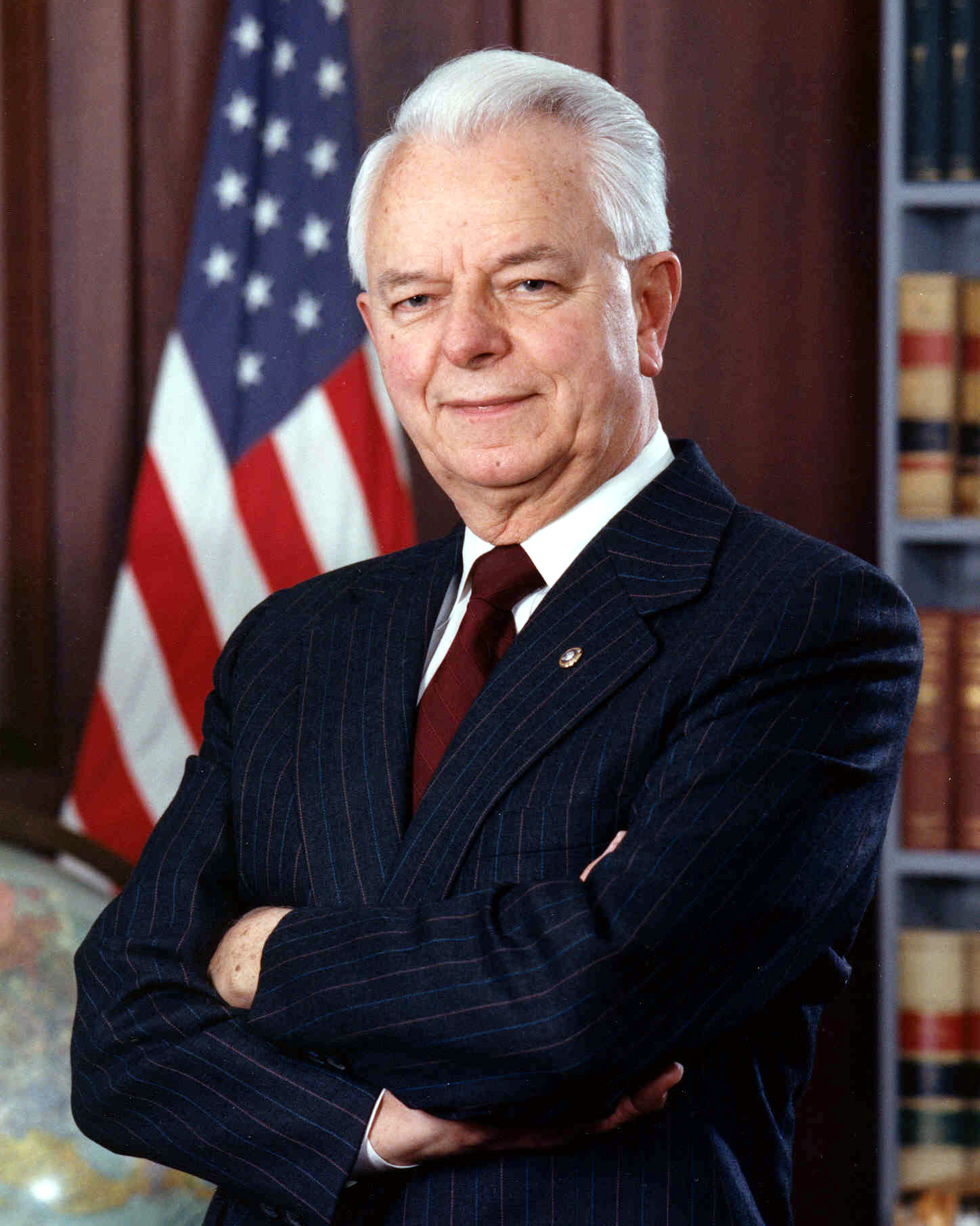
Robert Byrd
Robert Carlyle Byrd (born Cornelius Calvin Sale Jr.; November 20, 1917 – June 28, 2010) was an American politician and musician who served as a United States senator from West Virginia for over 51 years, from 1959 until his death in 2010. A Democrat, Byrd also served as a U.S. representative for six years, from 1953 until 1959. He remains the longest-serving U.S. Senator in history; he was the longest-serving member in the history of the United States Congress[1][2][3][4] until surpassed by Representative John Dingell of Michigan.[5] Byrd is the only West Virginian to have served in both chambers of the state legislature and in both chambers of Congress.[6]
For other people named Robert Byrd, see Robert Byrd (disambiguation).
Robert Byrd
Ted Stevens
Strom Thurmond
Strom Thurmond
Strom Thurmond
Strom Thurmond
Ted Stevens
Alan Cranston
Alan Cranston
Howard Baker
Bob Dole
George Mitchell
Mike Mansfield
Alan Cranston
Eugene Scott
Jack Nuckols
Multi-member district
Multi-member district
June 28, 2010 (aged 92)
Falls Church, Virginia, U.S.
2
Byrd's political career spanned more than sixty years. He first entered the political arena by organizing and leading a local chapter of the Ku Klux Klan in the 1940s, an action he later described as "the greatest mistake I ever made."[7] He then served in the West Virginia House of Delegates from 1947 to 1950, and the West Virginia State Senate from 1950 to 1952. Initially elected to the United States House of Representatives in 1952, Byrd served there for six years before being elected to the Senate in 1958. He rose to become one of the Senate's most powerful members, serving as secretary of the Senate Democratic Caucus from 1967 to 1971 and—after defeating his longtime colleague Ted Kennedy for the job—as Senate Majority Whip from 1971 to 1977. Over the next 12 years, Byrd led the Democratic caucus as Senate Majority Leader and Senate Minority Leader. In 1989 he stepped down, following the pressure to make way for new party leadership.[8] As the longest serving Democratic senator, Byrd held the position of President pro tempore four times when his party was in the majority. This placed him third in the line of presidential succession, after the vice president and the Speaker of the House of Representatives.
Serving three different tenures as chairman of the United States Senate Committee on Appropriations enabled Byrd to steer a great deal of federal money toward projects in West Virginia.[9] Critics derided his efforts as pork barrel spending,[10] while Byrd argued that the many federal projects he worked to bring to West Virginia represented progress for the people of his state. Notably, Byrd strongly opposed Clinton's 1993 efforts to allow homosexuals to serve in the military and supported efforts to limit same-sex marriage.[11] Although he filibustered against the 1964 Civil Rights Act and supported the Vietnam War earlier in his career, Byrd's views changed considerably over the course of his life; by the early 2000s, he had completely renounced racism and segregation. Byrd was outspoken in his opposition to the Iraq War. Renowned for his knowledge of Senate precedent and parliamentary procedure, Byrd wrote a four-volume history of the Senate in later life. Near the end of his life, Byrd was in declining health and was hospitalized several times. He died in office on June 28, 2010, at the age of 92, and was buried at Columbia Gardens Cemetery in Arlington County, Virginia.
In popular culture
Byrd had a prominent role in the 2008 Warner Bros. documentary Body of War directed by Phil Donahue. The film chronicles the life of Tomas Young, paralyzed from the chest down after a sniper shot him as he was riding in a vehicle in Iraq. Several long clips of Byrd show him passionately arguing against authorizing the use of force in Iraq. Later in the movie, Byrd has a one-on-one interview with Tomas Young in Byrd's Senate office, followed by a shot of Byrd walking beside the Young as they leave the Capitol.[274]
A fictionalized version of Byrd, then the Senate Majority Leader, was a character in the Jeffrey Archer novel Shall We Tell the President?[275]
Byrd was an avid fiddle player for most of his life, starting in his teens when he played in various square dance bands. Once he entered politics, his fiddling skills attracted attention and won votes. In 1978 when Byrd was majority leader, he recorded an album called U.S. Senator Robert Byrd: Mountain Fiddler (County, 1978). Byrd was accompanied by Country Gentlemen Doyle Lawson, James Bailey, and Spider Gilliam. Most of the LP consists of bluegrass music. Byrd covers "Don't Let Your Sweet Love Die", a Zeke Manners song, and "Will the Circle Be Unbroken". He had performed at the Kennedy Center, on the Grand Ole Opry and on Hee Haw. He occasionally took a break from Senate business to entertain audiences with his fiddle. He stopped playing in 1982 when the symptoms of a benign essential tremor had begun to affect the use of his hands.[276]
Byrd appeared in the Civil War movie Gods and Generals in 2003 along with then-Virginia senator George Allen. Both played Confederate States officers.[277]
Robert C. Byrd Center for Legislative Studies
In 2002, the Robert C. Byrd Center for Legislative Studies (CLS) was opened on the campus of Shepherd University. Adjoining the university's Ruth Scarborough Library, the CLS "advances representative democracy by promoting a better understanding of the United States Congress and the Constitution through programs and research that engage citizens."[278] The CLS is an archival research facility, housing the papers of Senator Robert C. Byrd in addition to the papers of Congressmen Harley O. Staggers Sr. and Harley O. Staggers Jr. and Scot Faulkner, the first Chief Administrative Officer of the United States House of Representatives. The CLS is a founding institution of the Association of Centers for the Study of Congress, "an independent alliance of organizations and institutions which promote the study of the U.S. Congress."[279]